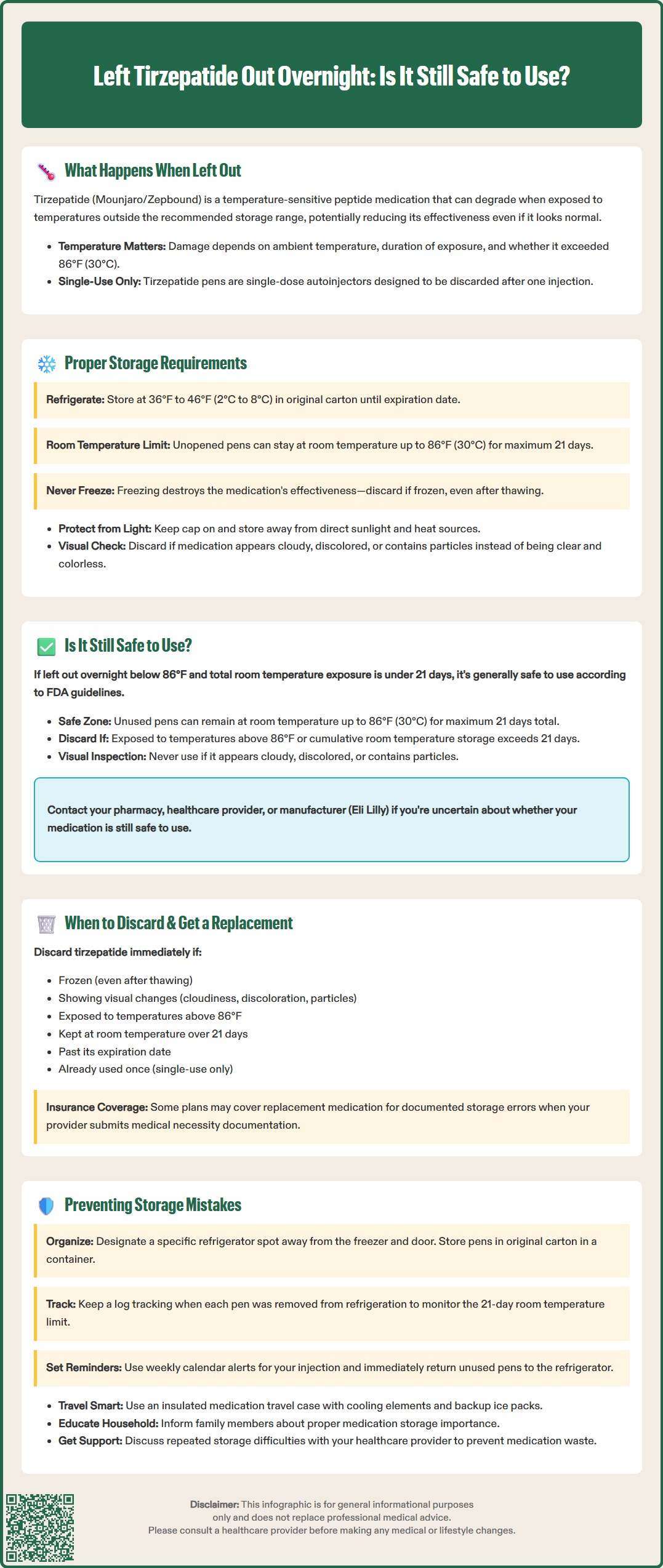LOSE WEIGHT WITH MEDICAL SUPPORT — BUILT FOR MEN
- Your personalised programme is built around medical care, not willpower.
- No generic diets. No guesswork.
- Just science-backed results and expert support.
Find out if you’re eligible

Discovering you left tirzepatide out overnight can be concerning, especially given the medication's cost and importance in managing type 2 diabetes or weight. Tirzepatide (Mounjaro, Zepbound) is a temperature-sensitive peptide medication requiring refrigeration to maintain its therapeutic effectiveness. Whether your medication remains safe to use depends on specific factors including ambient temperature, exposure duration, and cumulative room temperature storage time. Understanding FDA-approved storage guidelines helps you make informed decisions about medication safety and when replacement may be necessary. This guide provides clear, evidence-based information to help you assess your situation and protect your treatment outcomes.
Quick Answer: Tirzepatide left out overnight may still be usable if it remained below 86°F (30°C) and total room temperature storage stays within 21 days, but must be discarded if these limits were exceeded.
Tirzepatide is a glucose-dependent insulinotropic polypeptide (GIP) and glucagon-like peptide-1 (GLP-1) receptor agonist approved for type 2 diabetes management (Mounjaro) and chronic weight management (Zepbound). As a peptide-based medication, tirzepatide is sensitive to temperature fluctuations that can compromise its molecular structure and therapeutic efficacy.
When tirzepatide is left out overnight at room temperature, the primary concern is potential degradation of the active pharmaceutical ingredient. Peptide medications like tirzepatide contain complex protein structures that can denature or break down when exposed to temperatures outside the recommended storage range. This degradation may not be visible to the naked eye—the solution may appear unchanged—but the medication's potency can be reduced.
The extent of damage depends on several factors, including the ambient temperature during exposure, the duration left unrefrigerated, and whether the temperature exceeded 86°F (30°C). According to the FDA-approved prescribing information, tirzepatide pens should be stored in a refrigerator between 36°F to 46°F (2°C to 8°C). Unopened pens may be kept at room temperature up to 86°F (30°C) for a maximum of 21 days before use.
It's important to understand that tirzepatide pens are single-dose autoinjectors that should be discarded after one injection. Patients who discover their tirzepatide was left out overnight should assess the situation based on the specific storage guidelines in the FDA-approved labeling and consult their healthcare provider or pharmacist if uncertainty exists about the medication's integrity.

Understanding the correct storage parameters for tirzepatide is essential for maintaining medication efficacy and patient safety. The FDA-approved labeling for tirzepatide (marketed as Mounjaro for type 2 diabetes and Zepbound for weight management) provides specific temperature requirements.
Tirzepatide pens must be stored in a refrigerator at temperatures between 36°F to 46°F (2°C to 8°C) until the expiration date printed on the label. Key storage considerations include:
Store pens in their original carton to protect from light
Keep away from the freezer compartment—do not freeze
Avoid storing in the refrigerator door where temperature fluctuations are common
Do not use if the medication has been frozen, even if subsequently thawed
Before first use, tirzepatide pens may be stored at room temperature up to 86°F (30°C) for a maximum of 21 days. After this period, the pen must be discarded even if unused. During this time:
Keep the pen cap on to protect from light
Store away from direct heat sources and sunlight
Avoid extreme temperature environments such as car glove compartments
Importantly, tirzepatide pens are single-dose autoinjectors that should be discarded after one injection. The medication should appear clear and colorless, and free of particles according to the manufacturer's Instructions for Use. Any cloudiness, discoloration, or particulate matter indicates the medication should not be used regardless of storage conditions. Proper storage practices ensure optimal glycemic control and weight management outcomes while minimizing the risk of reduced efficacy from degraded medication.
Determining whether tirzepatide remains safe and effective after unintended room temperature exposure requires careful consideration of multiple factors. The decision depends primarily on the duration of exposure and ambient temperature conditions.
For unused tirzepatide pens, the FDA-approved labeling provides clear guidance: pens may be stored at room temperature up to 86°F (30°C) for a maximum of 21 days before use. If an unused pen was left out overnight and:
The temperature did not exceed 86°F (30°C)
The total time at room temperature (including this incident) remains within the 21-day window
The solution remains clear and colorless, free of particles
Then the medication is generally considered acceptable to use according to the manufacturer's guidelines.
However, if the pen was exposed to temperatures above 86°F (30°C) at any point, or if the cumulative room temperature storage exceeds 21 days, the medication should not be used. The FDA labeling is specific about these thresholds to ensure medication integrity.
It's important to note that tirzepatide pens are single-dose autoinjectors. After administration, the pen should be discarded regardless of storage conditions.
Patients should not use tirzepatide that appears cloudy, discolored, or contains particles, regardless of storage history. These visual changes indicate potential degradation that could affect both safety and efficacy.
The most prudent approach when uncertainty exists is to contact the dispensing pharmacy or prescribing healthcare provider before administering the dose. The manufacturer (Eli Lilly) also offers patient support programs that can provide guidance on specific storage incidents and may offer information about replacement options when appropriate.
Clear criteria exist for when tirzepatide must be discarded to ensure patient safety and therapeutic efficacy. Understanding these parameters helps patients make informed decisions and avoid using compromised medication.
Mandatory discard situations include:
Frozen medication: If tirzepatide has been frozen at any point, it must be discarded immediately, even if subsequently thawed. Freezing irreversibly damages the peptide structure.
Visual changes: Any cloudiness, discoloration, or particulate matter indicates degradation requiring immediate disposal.
Exceeded temperature limits: Discard if the pen was exposed to temperatures above 86°F (30°C) at any time.
Exceeded time limits: Discard any pen kept at room temperature for more than 21 days before use.
After injection: Tirzepatide pens are single-dose autoinjectors and must be discarded after one use.
Expired medication: Never use tirzepatide past the expiration date printed on the label.
For overnight room temperature exposure, discard decisions should follow FDA-approved guidelines. If an unopened pen was left out overnight but remained within the temperature limit of 86°F (30°C) and the total time at room temperature is still within the 21-day allowance, the medication may still be usable if the solution appears normal. However, if there is any uncertainty about temperature conditions or duration, consulting a pharmacist is advisable.
Patients should contact their healthcare provider or pharmacist when:
Uncertainty exists about storage conditions or duration
The medication appears normal but storage guidelines were clearly violated
Suboptimal glycemic control or reduced weight loss occurs after a storage incident
Some insurance plans may consider coverage for replacement when medication is compromised due to documented storage errors. The prescribing provider can submit documentation supporting medical necessity for early refill authorization. Patients should check with their specific insurer and the manufacturer's patient support program for options regarding replacement of compromised medication.
Implementing practical strategies can significantly reduce the risk of storage errors with tirzepatide and other temperature-sensitive diabetes medications. A systematic approach to medication management protects both the therapeutic investment and treatment outcomes.
Establish a consistent storage routine:
Designate a specific refrigerator location for diabetes medications, away from the freezer and door compartments
Use a small container or bin to keep pens organized and visible
Store pens in their original carton to protect from light
Create a medication log noting when each pen was removed from refrigeration to track the 21-day room temperature window
Implement safeguards against overnight incidents:
Remember that tirzepatide is administered once weekly, not daily
Mark your calendar or set a recurring reminder for your weekly injection day
Immediately return any unused pens to the refrigerator after taking out the pen you need for injection
Use visual cues such as a note on your refrigerator reminding you to check for any pens left out
Prepare for travel and routine disruptions:
Purchase an insulated medication travel case with cooling elements for trips
Request a small cooler bag from your pharmacy for transport from the pharmacy
Plan ahead for weekly administration, especially when traveling across time zones
Keep backup ice packs in your freezer for emergency cooling needs
Educate household members about the importance of proper medication storage, especially if others access the refrigerator regularly. Family members should know not to move or handle diabetes medications unnecessarily.
Proper medication storage is a critical component of diabetes self-management. Patients experiencing repeated storage difficulties should discuss their challenges with their healthcare provider. Regular communication with the diabetes care team about practical challenges ensures optimal treatment outcomes and prevents medication waste.
You can use tirzepatide left out overnight if the temperature stayed below 86°F (30°C), the total room temperature storage remains within 21 days, and the solution appears clear and colorless. If these conditions weren't met or you're uncertain, contact your pharmacist before using the medication.
According to FDA-approved labeling, unopened tirzepatide pens may be stored at room temperature up to 86°F (30°C) for a maximum of 21 days before use. After this period, the pen must be discarded even if unused.
Discard tirzepatide immediately if it was exposed to temperatures above 86°F (30°C) or if it was frozen at any point. Contact your healthcare provider or pharmacist about obtaining a replacement, as some insurance plans may cover medication compromised due to storage errors with proper documentation.
All medical content on this blog is created using reputable, evidence-based sources and is regularly reviewed for accuracy and relevance. While we strive to keep our content current with the latest research and clinical guidelines, it is intended for general informational purposes only.
This content is not a substitute for professional medical advice, diagnosis, or treatment. Always consult a licensed healthcare provider with any medical questions or concerns. Use of this information is at your own risk, and we are not liable for any outcomes resulting from its use.